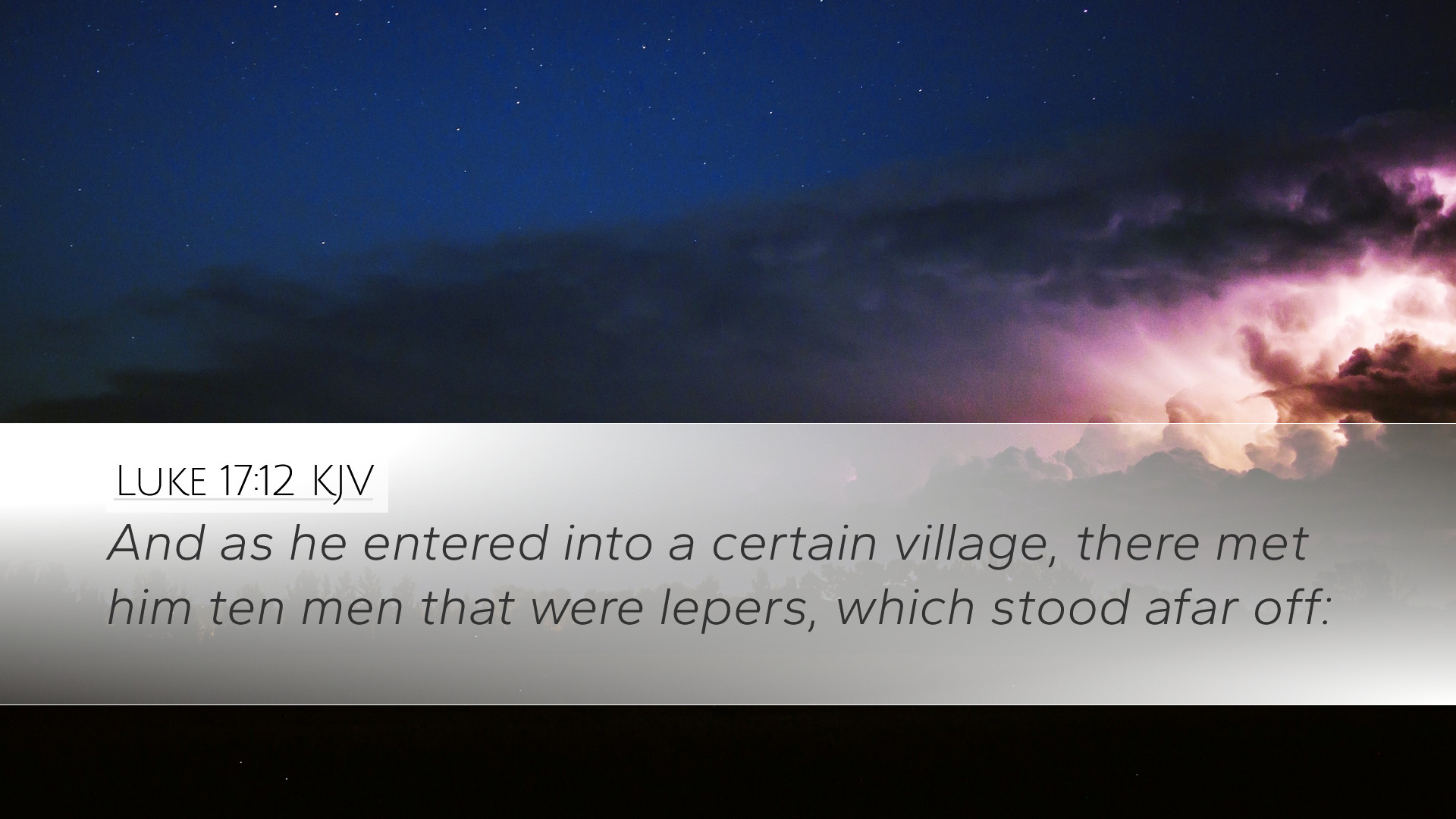Commentary on Luke 17:12
Bible Verse: "As he entered a village, ten lepers stood at a distance."
This brief yet profound verse lays the groundwork for a narrative that reveals deep theological themes and human experiences, particularly concerning the notions of healing, faith, and recognition of divine grace.
Contextual Background
In the narrative of Luke, the ministry of Jesus is characterized by numerous encounters with marginalized individuals. The setting of this verse—a village—indicates the ordinary circumstances where extraordinary divine activity unfolds. The presence of the lepers signifies not only physical ailment but also social ostracism that was prevalent in Jewish culture. This aspect is emphasized by the lepers standing at a distance, which was a requirement as per Jewish law that mandated separation for those suffering from skin diseases.
The Leprosy and its Implications
Matthew Henry notes that leprosy in biblical times was a visible manifestation of both physical and spiritual decay. The lepers symbolize all who are afflicted by sin and its isolating consequences. Their condition serves as an excellent metaphor for spiritual barrenness without the grace of God. Henry articulates that their distance from the community speaks volumes about alienation not only from society but also from religious participation.
Faith in Distress
Albert Barnes emphasizes that the lepers exhibited a form of faith. Their standing at a distance does not denote a lack of faith; rather, it illustrates their understanding of their condition and their response to Jesus. It is significant that they did not approach Jesus presumptively but maintained a respectful distance, showing their awareness of their place in society while still reaching out for help.
Recognition of Jesus' Authority
The lepers' action of standing at a distance can also be seen as a recognition of Jesus’ authority. Adam Clarke posits that their distance does not diminish their faith; they believed in Jesus’ power to heal even from afar. This recognition is critical, as it sets the stage for the subsequent elements of the narrative, including their call to Jesus and His response. Clarke highlights that the ten lepers serve as a collective, underscoring the universality of Christ’s mission—He came to seek and save the lost, reaching out to those deemed unworthy by society.
Theological Implications
In this encounter, various theological themes emerge:
- Alienation and Acceptance: The lepers’ physical and social alienation mirrors humanity’s separation from God due to sin. Their encounter with Christ symbolizes the restoration available to those who recognize their need for healing.
- Faith and Healing: The distance maintained by the lepers signifies both their faith and their acknowledgment of Jesus as the healer. Barnes’ insights here are pivotal; they believed that Jesus could heal them, which is foundational for receiving divine intervention.
- Community Dynamics: The presence of the lepers also invites reflection on communal relationships, particularly how society treats those who are suffering or marginalized. The subsequent interactions with Jesus challenge believers to consider their responses to the afflicted within their communities.
Call to Reflection
As the verse unfolds into the broader narrative of Luke 17, it invites pastors and theologians alike to engage with the question of how the church responds to those at a distance—whether physically, emotionally, or spiritually. The theme highlighted by both Henry and Clarke regarding the call to approach Christ in our need serves as an essential reminder for believers to maintain faith, despite feelings of isolation or societal rejection.
In conclusion, Luke 17:12 encapsulates a significant moment in the ministry of Jesus. It portrays the desperate human condition while simultaneously laying bare the grace that God extends to us, even when we feel furthest away. The commentary insights from Henry, Barnes, and Clarke collectively call for a deeper understanding of faith and healing's role within the life of a believer, ultimately pushing for a reflection on how one can reach out to those standing in physical or spiritual distance.


